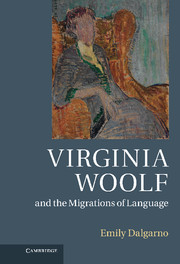Book contents
- Frontmatter
- Contents
- Preface
- Abbreviations
- The migrations of language: introduction
- Chapter 1 Translation and ethnography in “On Not Knowing Greek”
- Chapter 2 Antigone and the public language
- Chapter 3 Tolstoy, Dostoyevsky, and the Russian soul
- Chapter 4 Proust and the fictions of the unconscious
- Chapter 5 Translation and iterability
- Chapter 6 Assia Djebar and the poetics of lamentation
- Conclusion
- Bibliography of works cited
- Index
Preface
Published online by Cambridge University Press: 07 October 2011
- Frontmatter
- Contents
- Preface
- Abbreviations
- The migrations of language: introduction
- Chapter 1 Translation and ethnography in “On Not Knowing Greek”
- Chapter 2 Antigone and the public language
- Chapter 3 Tolstoy, Dostoyevsky, and the Russian soul
- Chapter 4 Proust and the fictions of the unconscious
- Chapter 5 Translation and iterability
- Chapter 6 Assia Djebar and the poetics of lamentation
- Conclusion
- Bibliography of works cited
- Index
Summary
Preface
Throughout this work I have continued to ask how the richness and historical depth of Woolf ’s language become apparent in the context of translation. Woolf’s expressed desire to transform the English language always seemed to me a measure of her ambition and stature as a writer, and a goal scarcely to be imagined. A study of her vocabulary shows that she gave us relatively few new words. How then did transformation come about? After “On Not Knowing Greek” her thoughts on translation are scattered throughout her fiction, essays, and diaries. Although her response to works of Russian fiction and to Proust shaped her writing practice significantly, there is no further essay on translation, perhaps because the language of the Victorian translator of Greek was no longer suitable, and others were not yet in circulation. Like the German Hellenists of her generation she learned that the translation of classical texts can be used to mount challenges to the ideology of national governments. Reading Proust with Vita Sackville-West suggested to Woolf that the language of gender comes into existence on the borders of consciousness, at the moment of awakening. Such a study enhances our sense of her language as responding to its history, and hospitable to the rhetorical strategies of other western languages.
The experience of a semester at the Camargo Foundation in Cassis greatly enhanced my understanding of translation and the social and political relationships among languages. My thanks to the Director, Michael J. Pretina, who arranged seminars with other fellows, and glimpses of the culture of Marseilles that widened the scope of my study, to include not only my chapter on Proust, but also work on Assia Djebar.
- Type
- Chapter
- Information
- Virginia Woolf and the Migrations of Language , pp. viii - ixPublisher: Cambridge University PressPrint publication year: 2011

